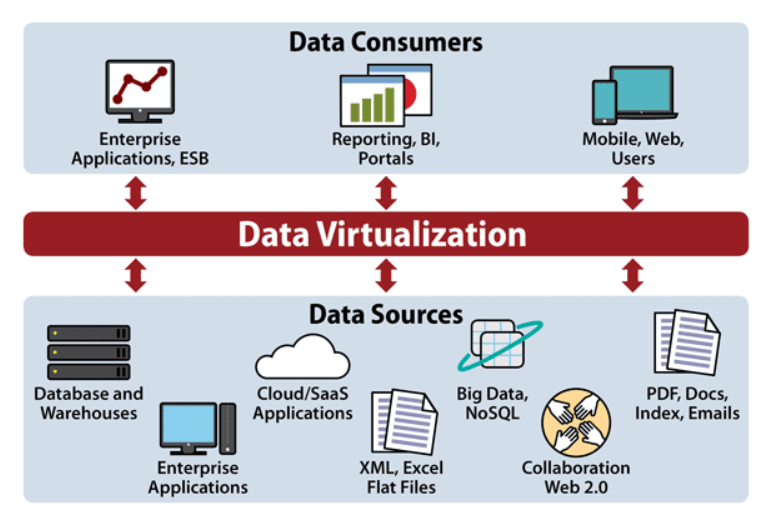Data Virtualization Market Analysis
The data virtualization market has emerged as a pivotal component in the realm of data management and analytics, enabling organizations to access and manipulate data from disparate sources without the need for physical data replication. This technology allows businesses to create a unified view of their data, enhancing decision-making processes and operational efficiency. As organizations increasingly recognize the value of real-time insights derived from diverse datasets, the demand for data virtualization solutions is projected to grow significantly.
The global market is experiencing robust growth, driven by the increasing volume of data generated across various sectors. The Data Virtualization Market was valued at approximately USD 8.019 billion in 2024 and is expected to reach around USD 31.73 billion by 2032, growing at a compound annual growth rate (CAGR) of over 18.76% during the forecast period. The surge in demand for big data analytics, coupled with the rising adoption of cloud-based services, is propelling this growth. Organizations are seeking agile solutions that facilitate seamless access to critical information while minimizing infrastructure costs associated with traditional data integration methods.
Market Key Players
Several key players dominate the data virtualization landscape, each contributing unique capabilities and innovations. Notable companies include Informatica, which offers comprehensive data integration solutions; Denodo Technologies, recognized for its advanced data virtualization platform; IBM, providing robust analytics tools integrated with virtualization capabilities; and Microsoft, which incorporates data virtualization features within its Azure cloud services.
Other significant players include SAP, Oracle, and TIBCO Software, all of which are investing heavily in R&D to enhance their offerings and maintain competitive advantages.
Get a Sample PDF of the Report at:
https://www.marketresearchfuture.com/sample_request/4447
Market Segmentation
The data virtualization market can be segmented based on deployment type, application area, organization size, and region.
-
Deployment Type: The market can be divided into on-premises and cloud-based solutions. Cloud-based deployments are gaining traction due to their scalability and cost-effectiveness.
-
Application Area: Key applications include business intelligence (BI), customer relationship management (CRM), enterprise resource planning (ERP), and others that require real-time access to integrated datasets.
-
Organization Size: The segmentation also includes small & medium enterprises (SMEs) and large enterprises, with SMEs increasingly adopting these technologies as they seek competitive advantages through enhanced analytics capabilities.
-
Region: Geographically, North America holds a significant market share due to early technology adoption and a strong presence of major vendors. However, regions like Asia-Pacific are anticipated to witness substantial growth owing to rapid digital transformation initiatives.
Market Dynamics
Several dynamics influence the growth trajectory of the data virtualization market:
-
Drivers: The exponential increase in unstructured data generated from various sources necessitates efficient management solutions like data virtualization. Additionally, organizations are focusing on reducing operational costs associated with traditional ETL processes.
-
Restraints: Despite its advantages, challenges such as concerns over security and compliance may hinder widespread adoption among certain industries that handle sensitive information.
-
Opportunities: The rise of artificial intelligence (AI) and machine learning (ML) presents opportunities for integrating advanced analytics capabilities into data virtualization platforms, further enhancing their value proposition.
-
Threats: Competition among existing players is intensifying as new entrants emerge with innovative solutions that challenge established providers.
Industry Developments
Recent developments in the industry highlight ongoing advancements in technology aimed at improving performance and usability. For instance, many vendors are incorporating AI-driven features into their platforms to automate processes such as metadata management and query optimization. Furthermore, partnerships between technology providers and cloud service platforms are becoming more common as organizations seek integrated solutions that leverage both cloud computing’s scalability and advanced analytics capabilities offered by data virtualization tools.
Moreover, there has been an increased focus on enhancing user experience through intuitive interfaces that allow non-technical users to easily access virtualized datasets without extensive training or technical knowledge.
Regional Analysis
Regionally, North America remains at the forefront of the data virtualization market due to its technological infrastructure and high adoption rates among enterprises across various sectors including finance, healthcare, retail, and telecommunications. Europe follows closely behind with a growing emphasis on regulatory compliance driving investments in secure data management practices.
In contrast, Asia-Pacific is poised for rapid expansion fueled by increasing digitalization efforts among emerging economies such as India and China where businesses are leveraging big data analytics for strategic decision-making purposes.
Overall, while North America currently leads in terms of revenue generation within this sector, Asia-Pacific’s potential for growth cannot be overlooked as more organizations adopt innovative technologies like data virtualization.
Get Complete Report Details:
https://www.marketresearchfuture.com/reports/data-virtualization-market-4447
Other Exclusive Reports:
Mobile Device Management Market Size, Share & Growth 2032
Network Transformation Market Size, Trends - 2032

